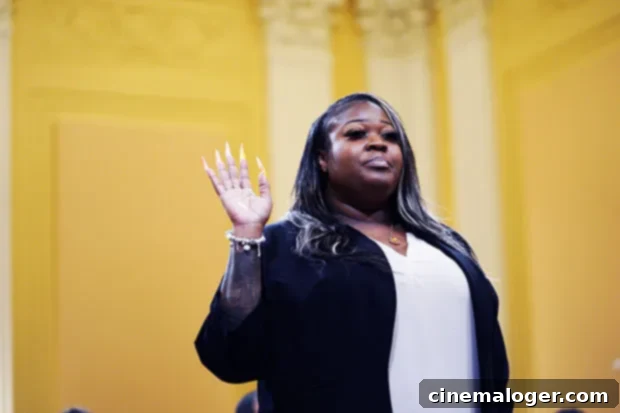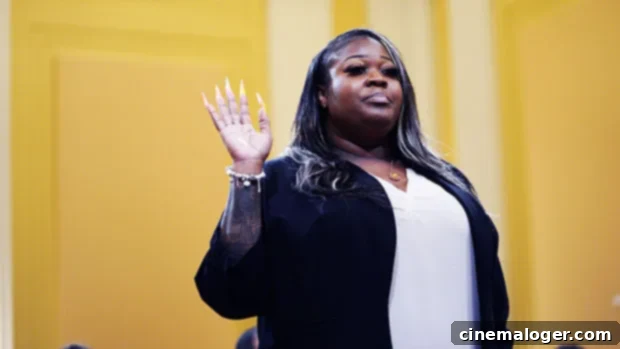The Personal Cost of Election Lies: Ruby Freeman and Shaye Moss Endure Threats After Trump’s False Accusations
In a powerful and emotional testimony before the House January 6 Committee, former Georgia election workers Wandrea ArShaye “Shaye” Moss and her mother, Ruby Freeman, bravely shared the harrowing ordeal they faced after being targeted by former President Donald Trump and his then-attorney Rudy Giuliani. Accused in baseless conspiracies related to the 2020 election, both women endured a torrent of death threats and relentless harassment, irrevocably altering their lives.
The committee, investigating the attack on the U.S. Capitol, dedicated a significant portion of its fourth session on Tuesday, June 21, 2022, to highlighting the immense personal toll inflicted upon these dedicated public servants. Shaye Moss, recounting the terrifying period, described receiving “A lot of threats wishing death upon me, telling me that I’ll be in jail with my mother and saying things like ‘Be glad it’s 2020, not 1920.'” This chilling reference to a darker chapter in American history underscored the racial undertones and severity of the threats they faced.
Shaye Moss, who was falsely accused by Trump, Giuliani and Fox News of carrying “suitcases” of ballots, testifies about the death threats she and her mom received.
“Telling me that, you know, I’ll be in jail with my mother and saying things like, be glad it’s 2020 and not 1920.” pic.twitter.com/acc9bnobDa
— Justin Baragona (@justinbaragona) June 21, 2022
The accusations hurled against Moss and Freeman were part of a broader, concerted effort by Trump and his allies to overturn the legitimate results of the 2020 presidential election, particularly in swing states like Georgia. Giuliani, in a state senate hearing clip shown by the committee, falsely claimed that the two election workers were engaged in orchestrating widespread voter fraud, including the illegal handling of “suitcases” filled with ballots. These claims were entirely fabricated and debunked by state and federal investigators, but their impact on Moss and Freeman was devastating and immediate.
Adding to the weight of the testimony, the committee played an audio recording of Donald Trump himself, in a phone call to Georgia Secretary of State Brad Raffensperger, labeling Moss and Freeman as “vote scammers.” The gravity of being personally named and targeted by the President of the United States resonated deeply with Moss. When asked how “horrible” it felt to hear the former president identify her by name in such a derogatory way, she expressed profound regret and guilt. “I felt bad for my mom, and I felt horrible for picking this job and being the one that always wants to help and always there. Never missing not one election. I just felt like it was my fault,” she confessed, highlighting the unjust burden placed upon her for simply doing her civic duty.
The repercussions of these false accusations extended far beyond emotional distress. Moss described how her life had transformed “in a major way.” The joy she once found in her work and everyday activities vanished, replaced by a constant sense of fear and insecurity. “I don’t want to go anywhere. I second guess everything that I do,” she stated, emphasizing the profound isolation she experienced. The simple act of handing out business cards, once a routine part of her job, became a source of anxiety. “It affected my life in a major way. In every way. All ’cause of lies. Me, doing my job. The same thing I’ve been doing forever,” Moss articulated, laying bare the brutal reality that innocent actions, when caught in the crosshairs of political falsehoods, can unravel an entire existence.
Congressman Adam Schiff (D-CA) concluded his questioning of Shaye Moss by playing a tape of Ruby Freeman’s deposition, further illustrating the severe emotional and psychological toll. Freeman’s testimony was heart-wrenching, as she openly wept while describing her feelings of pervasive vulnerability. “There is nowhere I feel safe. Nowhere,” she stated, her voice choked with emotion. “Do you know how it feels to have the President of the United States target you?” Her words served as a stark reminder of the immense power of the presidential platform and the devastating consequences when that power is wielded to spread disinformation against private citizens.
This particular hearing was the fourth public session conducted by the House Select Committee investigating the January 6, 2021 attack on the Capitol. Tuesday’s proceedings were specifically designed to illuminate how former President Trump and his campaign exerted immense pressure on local legislators and election officials, primarily in Georgia, to subvert and overturn the legitimate results of the 2020 election. The targeting of individuals like Ruby Freeman and Shaye Moss was a crucial component of this broader strategy, designed to sow doubt and create a pretext for intervention.

Previous hearings by the committee had already delved into various facets of Trump’s efforts to manipulate the 2020 presidential race in his favor. A prior session meticulously detailed the extraordinary pressure that Trump placed on his Vice President, Mike Pence, demanding that Pence unilaterally stop the certification of the election results on January 6. This unconstitutional demand pushed the boundaries of executive power and threatened the peaceful transfer of power, a cornerstone of American democracy. Shocking revelations from that hearing included the fact that rioters who stormed the Capitol came within approximately 40 feet of the vice president, a chilling proximity that underscored the peril he faced. Protesters at the January 6 rally were heard chanting, ominously calling for Pence to be hung. Further details revealed the extent of the name-calling and intense verbal abuse Trump had directed at Pence in the days leading up to the certification, all in an attempt to coerce him into an illegal act.
Throughout these recent hearings, the January 6 Committee has consistently unveiled much previously unseen evidence, including compelling video footage and audio recordings, striving to provide comprehensive answers and accountability for the Capitol attack. One particularly notable video showcased Republican Congressman Barry Loudermilk from Georgia giving a tour of the Capitol complex to a group of people on January 5, the day before the insurrection. It was later revealed that individuals from this tour group attended the rally that preceded the Capitol attack. After video footage emerged showing people on his tour making threatening messages against Democratic politicians, Loudermilk was formally requested to sit down for an interview with the committee, adding another layer to the complex narrative of the events leading up to January 6.

During the committee’s first primetime hearing, Representative Liz Cheney delivered a passionate opening statement that set the tone for the entire investigation. She unequivocally declared the committee’s objective to reveal Donald Trump’s central involvement in instigating the attack. “President Trump summoned the mob, assembled the mob, and lit the flame of this attack,” Cheney stated, laying direct responsibility at the feet of the former president. The testimonies of Ruby Freeman and Shaye Moss serve as powerful, humanizing accounts within this larger investigation, illustrating the profound and destructive real-world consequences of political disinformation and unfounded conspiracy theories on the lives of ordinary citizens dedicated to upholding the democratic process.
